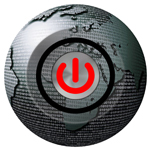
The last time someone could shut down the internet was probably when it only consisted of two computers. But in the recent years, governments has been exploring such an option.
The British inventor of the World Wide Web, Tim Berners-Lee, said that there is no "off switch" for the internet. The only possibility to do so is by governments around the world coordinating to turn it into a centralized system.
The way the internet is designed is very much as a decentralized system. At the moment, because countries connect to each other in lots of different ways, there is no one off switch, there is no central place where a person or people can turn it off. In order to be able to turn it off, or actually block the internet, is by the countries and governments agree and turn the internet from a decentralized system to a centralized system.
The first time people have thought whether to have an "off switch" for the internet was when cyber threats are getting their hands to the governments, loss of important information to expressed concerns from a former regime leader that had suppressed the use of the web to try to damp down the revolution.
Constructing such a switch would be extremely difficult. Borders are porous. Data packets can enter the other places in many different ways — via satellite, cables, packet radio, routed, etc.. And packets can be assigned a forged IP address, which means there is no foolproof method to be sure which packets are from home and which from abroad.
The internet is a global system of interconnected computer networks. It is a network of networks that consists of millions of private, public, academic, business, and government networks, of local to global scope, that are linked by a broad array of electronic, wireless and optical networking technologies. The internet has enabled entirely new forms of social interaction, activities, and organizing.
With the massive amount of users that are connected, millions of people are dependent on it with the amount that rises everyday. There is always a possibility that threats itself will increase if the internet will have an off switch.
Berners-Lee also said that it is a destruction of human rights if the when governments propose for centralizing the internet. A survey concluded that 61 percent of people said that the president should have the power to control, or even shut down, parts of the internet in the event of an emergency.
No one really knows what would happen if the internet that has grew immensely this past decade shuts down. Not only would emails go undelivered, stock exchanges and the flow of funds of all kinds could be disrupted, a crisis may happen. And then the world would still face another new challenge: how to turn it back on.